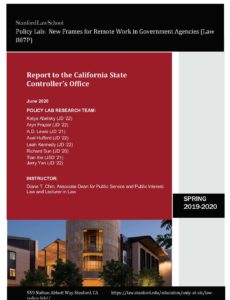New Regulatory and Policy Frameworks for Government Remote Work in Times of Crisis (Law 807P)
With the sudden onslaught of the pandemic COVID 19 creating emergency requirements regarding professional and social distancing, government agencies in California have had to implement “telework” or remote work policies quickly, with limited guidance and limited awareness of best practices.
Government agencies are complex institutions, performing diverse and vital functions and employing a wide variety of types of employees, some of whom are represented by labor bargaining units. They handle and manage information subject to privacy protections, and many of the communications engaged in between employees and with members of the public are also subject to public disclosure requirements. Public agencies also face financial, technological, and personnel resource limitations.
California state agencies need to be able to anticipate work and access issues due to its experiences with natural and manmade disasters, frequently in the form of earthquakes and fires. The disruptions created by this pandemic, because of its impacts on the workforce and economy, are extreme but highlight the need for broad reconsideration of work functions, locations, and worker support.
Working with one state agency, the California State Controller’s Office (SCO), the research team will evaluate best practices for remote work by government employees and develop recommendations to ensure that critical government functions continue during disasters and emergencies. Student researchers will also scope remote work policies that can be effectively implemented over the long term.


